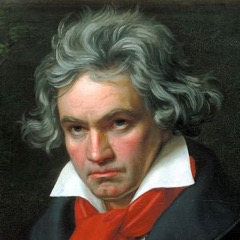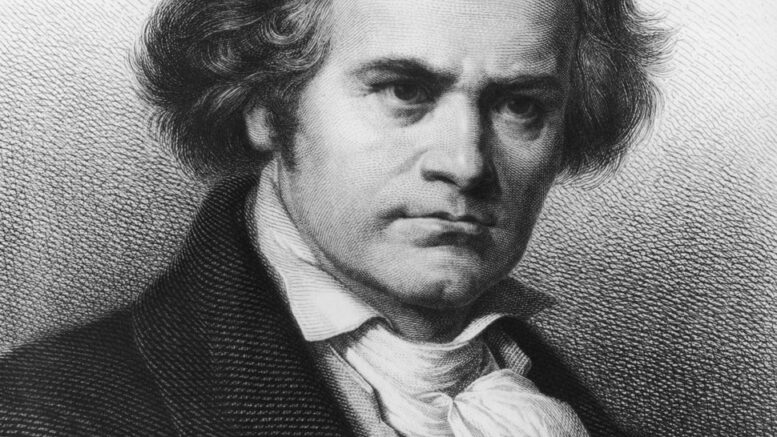Beethoven was born in 1770 in Bonn, Germany and lived 57 years until 1827. His earlier style was right out of the 18th century. It’s somewhat similar to the styles of Haydn and Mozart, but is still his own unique personality.
There is an incredible variety in the types of music he composed, and he was quite prolific. There are numerous compositions he wrote as a student, many compositions for piano solo, organ solo, and many songs for voice and piano. In fact he wrote over 100 songs, in many different styles, with texts in many different languages including settings of English, Irish and Welsh folk songs, two masses, several cantatas, 2 oratorios, and several large arias for different voice types with orchestral accompaniment.
He wrote all kinds of chamber music, including string trios, piano trios, 16 string quartets, piano quartets, piano quintets, wind trios, sextets, septets, octets, all kinds of duet combinations such as for mandolin and harpsichord, three duets for clarinet and bassoon, several piano duets and other duet combinations, 10 sonatas for violin and piano, 6 sonatas for cello and piano, one of them doubling as the great French horn sonata, 9 symphonies, 5 concertos for piano and orchestra, several works for violin and orchestra, 13 overtures, dramatic music for the theatre, wind band music, such as marches, various dances for string orchestra, his one opera, Fidelio, and a lot of music for piano solo, including 32 piano sonatas. The piano was his main instrument, upon which he was a famous virtuoso. In fact, Beethoven was particularly great at the art of improvising at the piano. Therefore much of his music was never written down!
Beethoven loved nature, and everyday went for a walk in the woods. It was there that many melodies and fragments of melodies occurred to him, and he would immediately pull his notebook out from his pocket and jot them down.
Beethoven’s method of composing was difficult. He would work on sketches for years before utilizing them, only to then rewrite, revise, and revise again over and over before he felt satisfied. He composed 4 different overtures for his opera Fidelio until he was satisfied. Happily many notebooks and sketchbooks have survived and we can get a glimpse at his creative activity by following the evolution of a work through its many revisions.
When he was 31 Beethoven wrote in a letter to a friend: “My art shall be exhibited only in the service of the poor. Oh happy moment, how fortunate I am to be able to further, if not to create such a moment.”
My mentor, the Buddhist philosopher, Daisaku Ikeda, wrote: “He felt that his art should be dedicated to the poor–an extremely revolutionary way of thinking for a musician in those days. And it was an attitude and way of life that brought him much financial hardship.”
The finale of his 9th String Quartet is very indicative of his rebellious, revolutionary nature, and the exhilaration of his spiritual victory over his physical deformity. This is why Beethoven is my hero. Beethoven started out with perfect hearing. However, when he was 27 he began to experience a gradual hearing loss that got worse and worse. The primitive hearing aids he used were called ear trumpets, and they helped for a while. But he eventually became completely deaf. When he realized that his hearing would never return, he became incredibly depressed and thought of committing suicide. He wrote: My ears whistle and buzz continuously, day and night. I am living a truly wretched life; for two years I have avoided all social gatherings because it is impossible for me to say to people: ‘I am deaf.’ How great was the humiliation when one who stood beside me heard the distant sound of a shepherd’s pipe, and I heard nothing; or heard the shepherd singing, and I heard nothing. Such experiences brought me to the verge of despair;–A little more and I would have put an end to my life. Art, art alone deterred me. I shall seize fate by the throat!”
Although Beethoven was subsidized by members of the aristocracy and royalty, he never intended his music to be for their exclusive enjoyment. He meant his music to be for everyone. In fact, when he was invited to visit the palaces and courts of Vienna he rebelled against the ritualistic protocol of behavior that he was expected to observe.
In the last years of his life, during the composing of his great Missa Solemnis, Solemn Mass, in which he set to music the words of the Roman Catholic Mass, a visitor arrived at his apartment, entered the outer room, and described the sounds he heard coming from Beethoven’s studio through closed doors: Beethoven banging on the piano, parts of the Credo, singing at the top of his lungs, screaming the choral parts, his feet stomping on the floor. Beethoven was not exactly considerate to his neighbors. He was very much a slob! His hair grew long and wild, and was usually uncombed. Because he kept firing servants, his dirty dishes accumulated for days without washing them. When he bathed, he splashed the water all over the room. After composing for several hours, he loved to take a break, by pouring cold water over his head. This water leaked through the floorboards to the apartment below so he was often in trouble with his landlords, and frequently changed apartments often moving every several months!
Accounts of his conducting describe him crouching down below the music stand during very quiet passages, and then as the music increased in volume, rising to the tip of his toes, his arms above his head, shouting at the top of his voice as the music reached its loudest part.
Referring to his gradual hearing loss, Beethoven is said to have said that the famous melody at the beginning of his 5th symphony symbolizes “fate knocking at the door”. By the finale of the symphony, the music is blazes forth triumphantly. Daisaku Ikeda wrote: “The clouds of torment and anguish could not obscure the vast blue skies of his inner spirit.”
The reason I love his music so much is because Beethoven so clearly revealed his innermost thoughts and feelings in his music. In fact, in his Missa Solemnis, he demonstrates what a master he was of setting words to music. At the beginning of the Missa Solemnis, Beethoven wrote “From the heart, may it go again to the heart.” Near the end of the work Beethoven depicts the sounds of war using trumpets and kettledrums, and wrote an incredible double fugue, as the music depicting war returns, and the singers call to god for peace.
Beethoven’s grave is in Vienna’s central cemetery. The white marble tombstone is in the shape of a metronome, a device that was invented during Beethoven’s lifetime to measure the speed music is played at, which he made great use of.
As you may know, Beethoven’s final symphony, the 9th, is the first time in history that voices appear as part of a symphony. It’s twice as long as other symphonies written up until that time, lasting a full hour. In the finale, he set to music Schiller’s poem Ode to Joy. Daisaku Ikeda wrote: ”The 9th Symphony is a tribute to the triumph of spirit that expresses Beethoven’s whole stormy life; it is a hymn to the sanctity of the human spirit. Beethoven’s 9th Symphony is the roar of the spirit of that great musical genius, who proclaimed: ‘At the end of suffering, there is joy!”‘ And at the concluding moments of the symphony the words are: ‘Love toward countless millions swelling blows one kiss to all the world!’
Here are brief excerpts from the program: Beethoven, My Hero:

